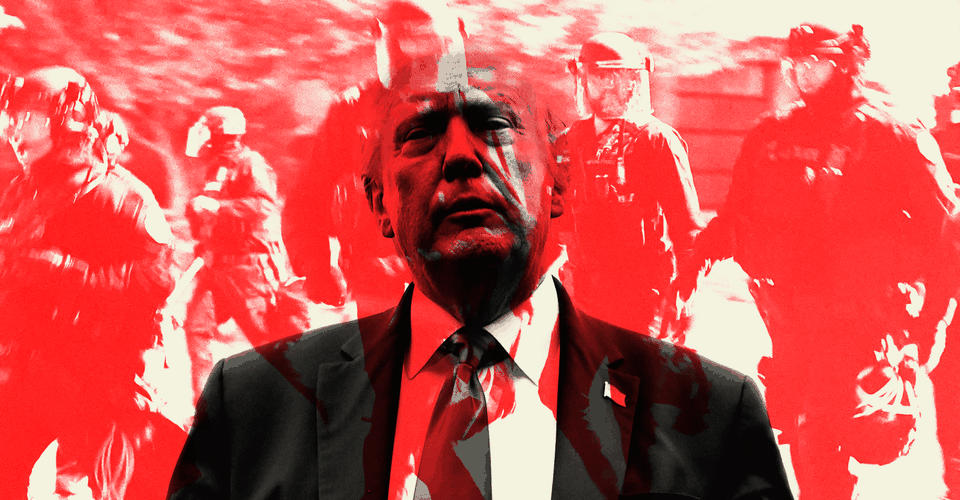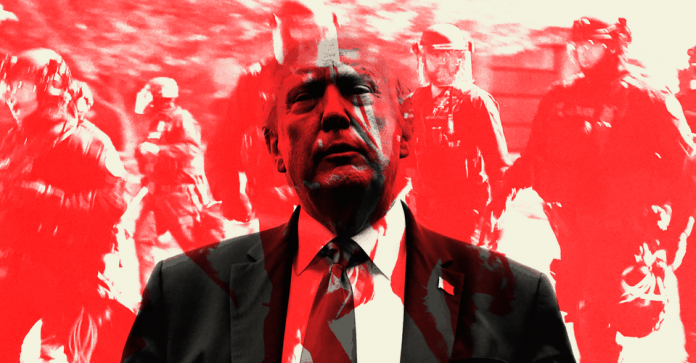
Win or lose in November, Donald Trump is waging a “law and order” campaign that will leave a trail of wreckage likely to outlast his presidency. Sending paramilitary-style forces into Portland, Oregon, and threatening to do the same in other cities, is damaging the reputations of the federal agencies he oversees and deepening the divide between law-enforcement agents and the citizens they’re supposed to protect.
What’s motivating him is no mystery. Losing ground in the polls, Trump is depicting Democrat-led cities as crime-soaked wastelands that threaten the suburban voters who have drifted away from him over the past four years.
“It’s a winning message for him that he’s not going to tolerate this disruption of society,” Senator Lindsey Graham, a South Carolina Republican and a Trump confidant, told me. “I do believe that most people, particularly those in the suburbs who are not very far from all this violence, are worried about the country getting out of hand.”
Violent crime has actually been falling steadily since the 1990s. An irony of Trump’s tough-on-crime rhetoric: The pandemic he’s failed to tame may help account for a recent rise in shootings. That hasn’t stopped him from trying to capitalize on the moment by casting himself as a bulwark against urban unrest, the savior of the suburbs. “Richard Nixon ran a campaign on ‘law and order’; he won 49 states” in 1972, one person close to the Trump campaign told me. “‘Law and order’ works.”
Except the federal presence in Portland produced neither law nor order. Agents in camouflage shot tear gas and swung batons to subdue a crowd that Trump labeled “anarchists.” Let’s meet one. She’s Sharon Meieran, 55, an emergency-room doctor and a Multnomah County commissioner. She showed up one night outside the United States courthouse building that has been the focal point of the demonstrations, wanting to protest police violence against Black men and the federal presence in Portland. Agents fired tear gas into the crowd. Still in her hospital scrubs, she started choking. “I couldn’t open my eyes, and I stumbled down the street,” she told me. “It was so unreal.”
Plunked into these demonstrations are Department of Homeland Security agents trained for very different sorts of missions: averting terrorist threats or protecting the border. They faced teeming crowds where many protested peacefully, others scrawled graffiti on the courthouse wall, and a few others tried to down a security fence. The mission was beyond their training and put them and the public at risk, according to former department officials. “They place those officers in a position to fail by taking them so far outside their comfort zone and where their training is,” John Sandweg, who served as the acting general counsel of the department under former President Barack Obama, told me. Oregon Attorney General Ellen Rosenblum has opened a criminal investigation into the actions of federal agents seen beating protesters, including a Navy veteran who was pepper-sprayed.
“When you’re uninvited, you ought not to make a mess of things, and you ought to go home when you’re asked to go home,” Rosenblum told me. The department is already being sued by Portland protesters over its methods.
A comparatively young agency created in response to the September 11 terrorist attacks, Homeland Security was under pressure long before the Portland debacle. DHS has overseen the implementation of policies separating migrant families coming from Mexico and sticking children in squalid conditions. Critics have called for dismantling the department’s Immigration and Customs Enforcement unit, whose aggressive tactics have included arresting longtime undocumented immigrants for minor offenses. A fresh embarrassment came last week, when The Washington Post reported that the department had compiled information on journalists covering the protests, striking at constitutional protections ensuring a free and independent press.
Portland may turn out to be a tipping point. Tom Ridge, the department’s first secretary, appointed by former Republican President George W. Bush, told me that scenes from Portland demonstrate his old agency has strayed far from its intended purpose. “The goal then was the same as today: to protect and defend this country and our interests from the ever-present threat of global terrorism, period,” Ridge said. “It was never the intention to establish a department that the president can view as his personal militia.”
Wary of collaborating with an agency that looks so politicized, local law-enforcement officials may be more reluctant to share information with DHS agents about the drug, human-trafficking, and gang crimes they’re investigating. “Going to war with the states has a dramatic impact on the effectiveness of DHS in performing its job,” Sandweg added. “There are so many areas where DHS relies on state and local partners to carry out its mission. This is an unmitigated disaster in terms of the amount of work that has to be done to rebuild trust with all the various stakeholders that DHS relies upon to do their job. … Information-sharing agreements get torn up. That’s the lifeblood of what these departments do. All that is gone. Gone.”
Larry Krasner, the district attorney in Philadelphia, told me that the federal government’s actions in Portland “breed distrust at a time when we sorely need in the United States a restoration of trust between individuals and law enforcement who are supposed to serve them, rather than step on them. We also need to have a restoration of trust between more liberal cities and these other agencies. All of this is very pernicious, very destructive.”
Should a Joe Biden administration take over next year, there could be an investigation into how DHS allowed itself to become a political tool of a president seeking reelection. A reinvigorated inspector general’s office may look for answers as to why agents deployed in Democratic-run cities when crime is prevalent in Republican-led cities and states, as well. “A major question in the wake of the Trump years is what kind of consequences should there be for people who participated either actively or passively in abetting the Trump administration’s extra-legal behavior,” Nils Gilman, vice president of the Berggruen Institute, a Los Angeles-based think tank, told me. “If there’s no accountability, then the distrust will linger for a long time. It will be a hard political question for whoever is the next DHS secretary. Do we allow these folks who participated in doing these things to stick around in their jobs, or do we say, that was totally unacceptable?”
A database kept by The Washington Post and the Partnership for Public Service, a think tank, shows that only about one-third of key DHS positions have been filled—fewer than any other cabinet agency. A former DHS official told me that despite legal requirements, “most of the senior political leadership positions in the department have been filled by acting officials … and there are no nominations for these positions. It’s a deliberate strategy on the part of the president and [White House senior adviser] Stephen Miller to reward loyalists and to facilitate the micro-management of the department’s activities in certain areas from the White House.” Even the agency’s secretary, Chad Wolf, is serving only in merely an “acting” capacity.
A reckoning could involve breaking up an agency that some of its former leaders believe has lost its way. “These agencies don’t seem to recognize that the people are demanding change,” Michael German, a former FBI agent and now a fellow at the Brennan Center for Justice, told me. “The more they resist the call, the deeper those changes will be. DHS is still an experiment in many ways. And clearly, many Americans are seeing it as a failed experiment.”
One of the Trump administration’s mistakes was to send federal agents to a city and state that didn’t want them, Ridge said. “I would say to this president that it’s totally unacceptable to send in these federal agents unilaterally,” Ridge said me. “Communication and collaboration in combating terrorism, crime, and drug running is what the federal system is all about. But unilateral incursion into my city or state—I don’t think anybody would find that acceptable. Frankly, I think many of us would question its constitutionality.”
Trump is threatening more of the same. Federal agents have been moving out of the Portland courthouse under a deal struck with Oregon officials, ceding law enforcement responsibilities to local and state police. But Trump says he might deploy agents to other cities, recreating the combustible conditions that he seems to have decided help him politically. Philadelphia, the biggest city in a perennial swing state, is one place he’s suggested he’d target. Officials there want to keep the feds out. “Some of the stuff we saw in Portland—whisking people off to unknown locations—is reminiscent of a South American dictator,” Philadelphia Mayor Jim Kenney told me.
Trump’s focus on cities and states led by Democrats distorts the complicated and interlocking realities that explain urban crime, including poverty, racism, and lack of opportunity. Blaming mayors “is part of the political playbook but it makes no criminological sense,” Richard Rosenfeld, a criminologist at the University of Missouri St. Louis, told me. “What is it about a Democratic mayor that’s going to increase violent crime?”
Even the pandemic—the catastrophe Trump let spin out of control—has played a part.
A new study of 27 different cities found that homicides and aggravated assaults rose by more than a third in late May and June. The authors wrote that police were hampered in preventing and investigating crime by the social-distancing requirements brought about by the pandemic. “Subduing the COVID-19 epidemic is also a necessary condition for halting the rise in violence,” reads the report, prepared by Rosenfeld and a colleague for the newly created National Commission on COVID-19 and Criminal Justice.
“When the public loses faith that law enforcement is there to serve their interests and protect them from crime, it’s hard to maintain the legitimacy necessary for those agencies to succeed in their mission,” German, the former FBI agent, told me.
Election Day is now 90 days away. In his determination to win, Trump is risking damage to the federal government—and to the fragile bonds between the public and law enforcement—that could take years to rebuild, if it ever does. “Sometimes it never rebuilds,” Krasner said. “This is a long-term problem that has been created for a short-term political gain,” German said.
The post Trump After Portland appeared first on The Atlantic.







